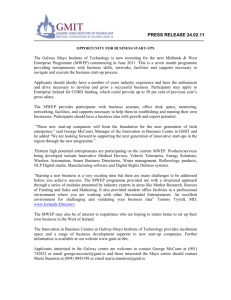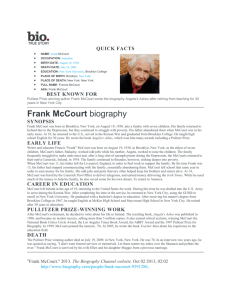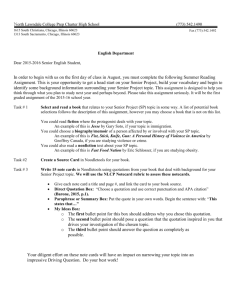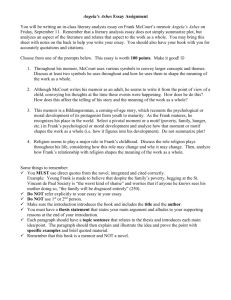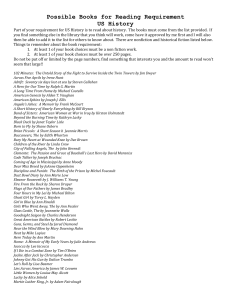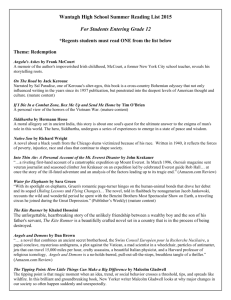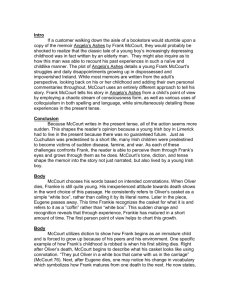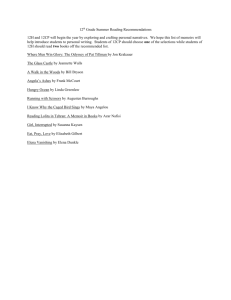Fact or Fiction: Memoir, Frank McCourt, and the Question of Truth By
advertisement
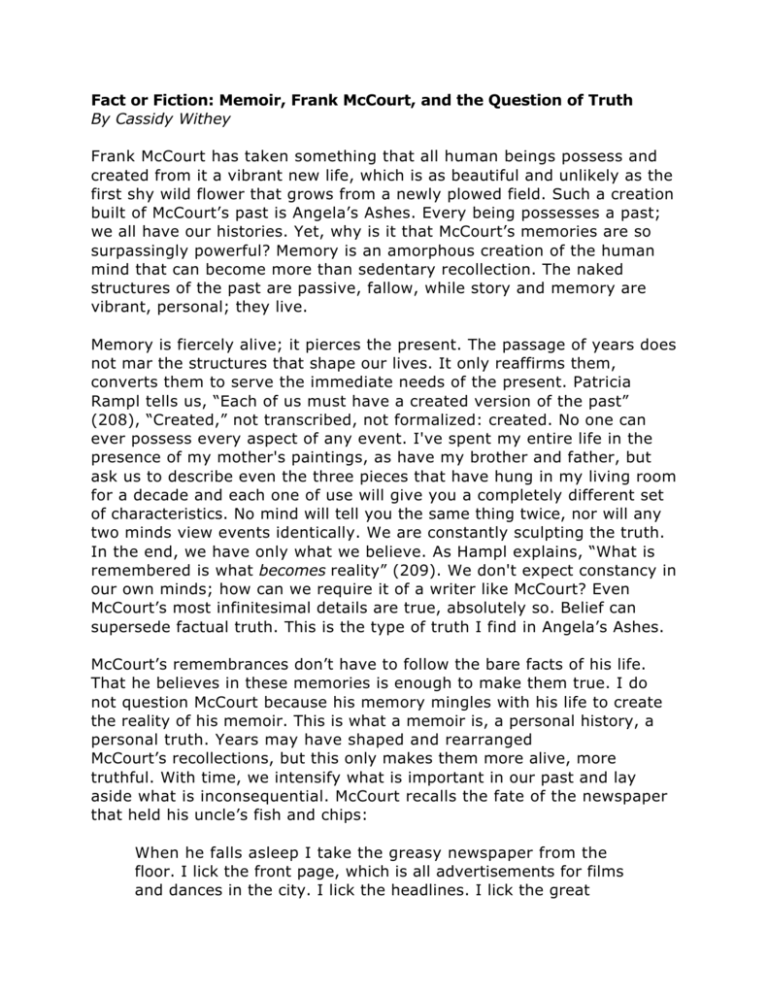
Fact or Fiction: Memoir, Frank McCourt, and the Question of Truth By Cassidy Withey Frank McCourt has taken something that all human beings possess and created from it a vibrant new life, which is as beautiful and unlikely as the first shy wild flower that grows from a newly plowed field. Such a creation built of McCourt’s past is Angela’s Ashes. Every being possesses a past; we all have our histories. Yet, why is it that McCourt’s memories are so surpassingly powerful? Memory is an amorphous creation of the human mind that can become more than sedentary recollection. The naked structures of the past are passive, fallow, while story and memory are vibrant, personal; they live. Memory is fiercely alive; it pierces the present. The passage of years does not mar the structures that shape our lives. It only reaffirms them, converts them to serve the immediate needs of the present. Patricia Rampl tells us, “Each of us must have a created version of the past” (208), “Created,” not transcribed, not formalized: created. No one can ever possess every aspect of any event. I've spent my entire life in the presence of my mother's paintings, as have my brother and father, but ask us to describe even the three pieces that have hung in my living room for a decade and each one of use will give you a completely different set of characteristics. No mind will tell you the same thing twice, nor will any two minds view events identically. We are constantly sculpting the truth. In the end, we have only what we believe. As Hampl explains, “What is remembered is what becomes reality” (209). We don't expect constancy in our own minds; how can we require it of a writer like McCourt? Even McCourt’s most infinitesimal details are true, absolutely so. Belief can supersede factual truth. This is the type of truth I find in Angela’s Ashes. McCourt’s remembrances don’t have to follow the bare facts of his life. That he believes in these memories is enough to make them true. I do not question McCourt because his memory mingles with his life to create the reality of his memoir. This is what a memoir is, a personal history, a personal truth. Years may have shaped and rearranged McCourt’s recollections, but this only makes them more alive, more truthful. With time, we intensify what is important in our past and lay aside what is inconsequential. McCourt recalls the fate of the newspaper that held his uncle’s fish and chips: When he falls asleep I take the greasy newspaper from the floor. I lick the front page, which is all advertisements for films and dances in the city. I lick the headlines. I lick the great attacks of Patton and Montgomery in France and Germany. I lick the war in the Pacific. I lick the obituaries and the sad memorial poems, the sports pages, the market prices of eggs butter and bacon. I suck the paper till there isn't a smidgen of grease. I wonder what I'll do tomorrow. (296) This single memory crystallizes the desperation of McCourt’s childhood on the edge of starvation. When this image is intensified by the adult mind, the reader can realize that licking the war, death, politics, entertainment, is an illustration that hunger and survival are paramount to all else. Here, also, McCourt’s present being has fleshed out his memory, for certainly he does not explicitly remember that day’s newspaper. McCourt elaborates on his memory to create a more complex rendering of his situation. Simply telling the reader he licked newsprint is not equivalent, on an emotional level, with the description of licking market advertisements and obituaries. And what of the stories of McCourt’s mother and grandmother? Does not every family possess its own collective memory, its own folklore? Are not such collective memories imbibed by children in their youngest days, almost by osmosis, without effort? Still more logical, wouldn’t a man who so obviously loves to tell stories, coming from a culture that reveres oral history, be likely to have a mother, father, or other close relative who loved to tell the family’s history as well, even if it were not readily visible? Tales are told amongst all families, tales like those of the night of Angela’s birth. Family folklore of a father banished, a damaged child, a midwife lamenting over a wasted dress, and a child “named Angela for the Angelus which rang the midnight hour, the minute of her coming and because she was a little angel anyway” (McCourt 14). These clannish remembrances would have filtered early into McCourt’s mind, so early as to be inextricable from his own memories. There is an issue that I have failed to account for thus far that renders all my efforts until this point superfluous and inconsequential. If I seek to discuss McCourt’s veracity, I must ask: does such veracity even matter? By writing his life so, does not McCourt create the “truth?” After all, the reader believes him, doesn’t she? Even more importantly, does she want to believe? In all probability, the reader will never even see Frank McCourt in the garish light of reality, let alone speak to him. So why is she striving so feebly to find the elusive truth? According to Kate Ronald, “we don’t ‘deliver’ what we write orally very much anymore” (170). However, this is exactly what McCourt does to create in his memoirs such vibrancy and veracity. We do not question stories orally rendered for us. The reader will hear McCourt’s story more than read it. She feels the sense of oral tradition in Angela’s Ashes through the dramatic voice of McCourt’s remembrance. When McCourt recites Shakespeare, “I do believe, induced by potent circumstances/ that thou art mine enemy” (McCourt 196), the reader does not question his quotation. Is it correct? Did he really hear it? It does not matter to the reader. She knows this is McCourt’s story therefore, it cannot be wrong. Again, this memory has become reality in the necessary context. But, my arguments fall short of their purpose if I fail to comment on the elaborate flourish of detail that prevails in McCourt’s memory. How does he capture such detail after so long? I think the answer is very simple. If we assume the truth, in memory, is only what we believe, then imagination alone can fill in the fine lines which time obscures. Time and memory retain the pith of our experiences so that, though, for example, I may not recall the exact hair style my mother had when I was five, I shall always remember her gentle, bluish-hazel eyes. The hair style is unimportant; it was never the pith of my mother. I can fill in anything mundane I remember about the hair, but the truth is retained in those eyes. The memory is even more truthful, if I add, I believe, she curled the ends of her silky, long, baby-fine, blond hair. This detail hinges on my belief; because I believe it to be correct and factual, it becomes equivalent to fact in my memory. So, when McCourt tells the reader “When [Malachy] smiles you can see how white and straight and pretty his teeth are and you can see the shiny blue of his eyes, the pink of his cheeks” (43), it is inconsequential if it were exactly so, at the moment in his childhood. It is an honest description because it is what McCourt gives up to the reader as the essence of his memory of Malachy. McCourt portrays the factual construction of his past honestly in Angela’s Ashes because very little of our life can be solidified as bare fact. After the passage of years, our past becomes more what we believe than the facts that served as a framework to our lives. A memoir is a personal history, “a personal confirmation of selfhood” (Hampl 211). “The version we dare to write is the only truth, the only relationship we can have with the past” (Hampl 209). This is what McCourt gives the reader- his past as shaped by his mind and self. McCourt’s unique past, his truth, his memory: this is memoir. The barren, inanimate facts of our lives are reserved for bibliographies. Works Cited Hampl, Patricia. “Memory and Imagination.” The Anatomy of Memory. Ed. James McConkey. New York: Oxford University Press, 1996.201-211. McCourt, Frank. Angela’s Ashes. New York: Touchstone, 1999. Roland, Kate. “Style: The Hidden Agenda in Composition Classes or One Reader's Confession.” The Subject is Writing. Ed. Wendy Bishop. Portsmouth: Boynton/Cook Publishers, 1999. 169-183.

